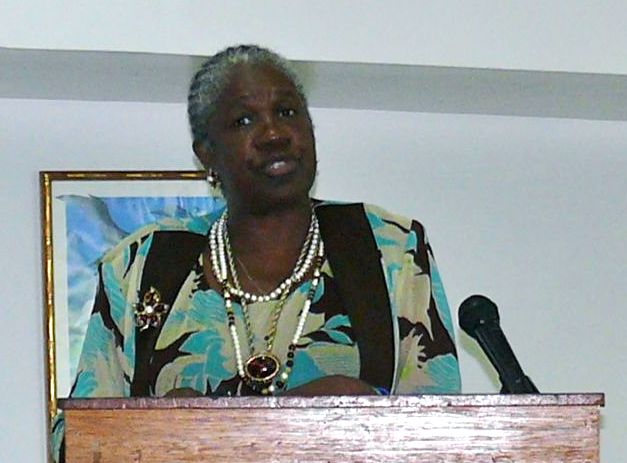
Clergy and others working with area churches and religious institutions were gathered in the Palms’ conference room for a faith-based summit on strengthening families and healthy childhood development hosted by CFVI and the Early Childhood Advisory Council of the Governor’s Children and Families Council. There will be a second summit on St. Thomas Wednesday morning at the Winward Passage hotel.
Hirsh said poverty creates stressors and correlates with less availability of support mechanisms, putting children in poverty at risk to a variety of threats to their educational, social and even physiological development.
Almost 30 percent of Virgin Islands children fall below the federal poverty threshold, with St. Croix faring worst, with 35.3 percent in poverty, she said. And those figures do not take into account the very high cost of living, which indicates the real poverty level is higher than recorded, she said.
"Children age one to five years are the most vulnerable to poverty’s impacts," she said. They are more likely to be behind, more likely to lose educational ground over the summer months and more likely to suffer health effects, according to Hirsh.
"This is why it is imperative we work together, particularly in the early years," she said. “That is when the brain structure is being established. Like a house, the architecture is critical. Negative experiences, like moving from home to home, are actually stresses that affect the architecture’s development.”
Hirsh pointed to data showing that high stress reduced and changed the structure of neuronal connections in the brain.
Studies have found more brain development in wild animals than in captive animals, which have constrained environments and less stimulation, she said. "This tells us greater stimulation can also stimulate brain growth."
The quality of early care and nurturing has a decisive and long-lasting impact on how children
develop, their ability to learn and their capacity to regulate their emotions, she said. If children are not secure, they spend time dealing with those emotional needs instead of developing and growing. So "nurturing builds social confidence and consequently cognitive skills," she said.
Early vocabulary exposure is one area of particular importance, Hirsh said, to the extent that children who have parents with a college education "have about 30 million more words they are exposed to."
This difference spills over into school progress, when children can read but test poorly because they have trouble comprehending what they read, she said.
Addressing the problem on a more practical than scientific level, Juanita Blount-Clark of the D.C.-based Center for the Study of Social Policy and the Rev. Darrell Armstrong of Shiloh Baptist Church in Trenton, N.J., shared strategies for strengthening families and targeting where to give help to get the greatest benefit.
Blount-Clark developed an approach based on building five protective factors in families, including: parental resilience; social connections; knowledge of parenting and child development; providing support in times of need; and emotional competence.
Armstrong has adopted Blount-Clark’s approach, both as a pastor and in government, heading New Jersey’s Division of Child Abuse Prevention for three years. But he feels religious organizations have a special role to play, because clergy and the church are invited into the home and made part of the family life in a way that no other organization is.
"These protective factors I believe need to be embedded in our houses of worship," Armstrong said.
As a reverend, Armstrong encourages clergy not to bless babies until their families have gone through at least three to seven sessions on brain and socio-emotional development. He said he speaks from his own Baptist faith, but that he didn’t want to exclude any other faiths.
Armstrong spoke about Catholic teaching and training as well as what Jewish boys and girls undergo before their bar mitzvahs and bat mitzvahs.
"You don’t get there until you go through some training," he said. These sorts of institutional traditions give clergy an opportunity to be there to help parents and prevent neglect, he said.
Many in the audience were intrigued and receptive to these ideas.
"It was a very interesting message," said Deacon Arnold Helenes of St. Ann Catholic Church. "We have so many negative things happening; it will take a lot of time to see the changes, but at least it is begun," Helenes said.





